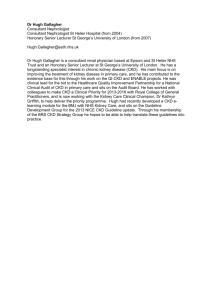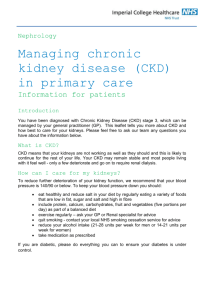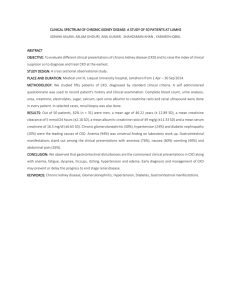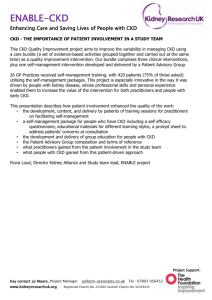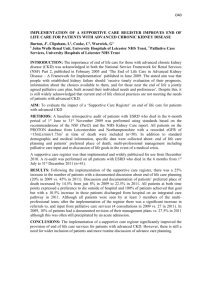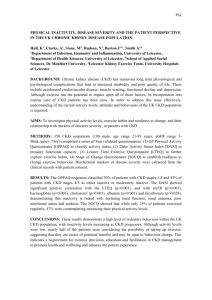Chronic Kidney Disease Evidence Based Nutrition Practice Guidelines
advertisement
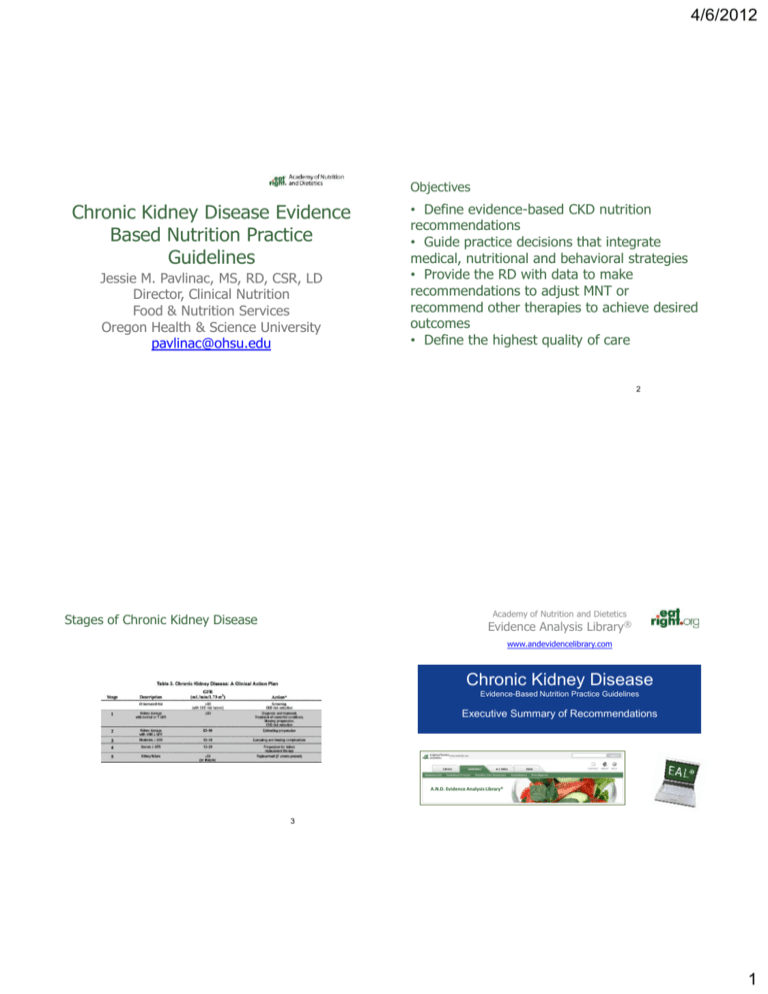
4/6/2012 Objectives Chronic Kidney Disease Evidence Based Nutrition Practice Guidelines Jessie M. Pavlinac, MS, RD, CSR, LD Director, Clinical Nutrition Food & Nutrition Services Oregon Health & Science University pavlinac@ohsu.edu • Define evidence-based CKD nutrition recommendations • Guide practice decisions that integrate medical, nutritional and behavioral strategies • Provide the RD with data to make recommendations to adjust MNT or recommend other therapies to achieve desired outcomes • Define the highest quality of care 2 Academy of Nutrition and Dietetics Stages of Chronic Kidney Disease Evidence Analysis Library® www.andevidencelibrary.com Chronic Kidney Disease Evidence-Based Nutrition Practice Guidelines Executive Summary of Recommendations A.N.D. Evidence Analysis Library® 3 1 4/6/2012 Target CKD Population • • • • Evidence-Based Dietetics Practice the use of systematically reviewed scientific evidence in making food and nutrition practice decisions by integrating best available evidence with professional expertise and client values to improve outcomes. Adult (19 - 44 yrs) Middle Age (45 - 64 yrs) Aged (65 - 79 yrs) Male and Female A.N.D. Scope of Dietetics Practice Framework: Approved by A.N.D. House of Delegates © 2010 A.N.D. Evidence Analysis Library® 5 Guideline Overview MNT & CKD Focus of MNT Guidelines: Scientific evidence supports MNT to effectiveness of therapy for CKD. Adults with CKD - stages 1 - 5, - including post kidney transplant - not on dialysis. © 2008 A.N.D. Evidence Analysis Library® 6 © 2010 A.N.D. Evidence Analysis Library® 7 © 2010 A.N.D. Evidence Analysis Library® Topics include: •Medical nutrition therapy and dietitian intervention •Energy needs •Protein needs •CKD-bone mineral disorder •Anemia •Diabetes •Obesity •Hypertension •Disorders of lipid metabolism •Physical activity •Fish oil therapy 8 2 4/6/2012 Statement of Intent Disclaimer While A.N.D. evidence-based nutrition practice guidelines represent a statement of best practice based on the latest available evidence at the time of publishing, they are not intended to overrule professional judgment. Rather, they may be viewed as a relative constraint on individual clinician discretion in a particular clinical circumstance. The independent skill and judgment of the health care provider must always dictate treatment decisions. These nutrition practice guidelines are provided with the express understanding that they do not establish or specify particular standards of care, whether legal, medical or other. Evidence-based nutrition practice guidelines are developed to help dietetic practitioners, patients and consumers make shared decisions about health care choices in specific clinical circumstances. If properly developed, communicated and implemented, guidelines can improve care. © 2010 A.N.D. Evidence Analysis Library® 9 © 2010 A.N.D. Evidence Analysis Library® 10 Each Recommendation is Rated: • • • • • Academy of Nutrition and Dietetics Chronic Kidney Disease Evidence Based Nutrition Practice Guideline Strong, Fair, Weak, Consensus, or Insufficient Evidence Each Recommendation Statement is: • Conditional or • Imperative Executive Summary of Recommendations © 2010 A.N.D. Evidence Analysis Library® 11 © 2010 A.N.D. Evidence Analysis Library® 12 3 4/6/2012 Recommendation Ratings (2 of 2) Recommendation Ratings (1 of 2) Statement Rating Strong The Workgroup believes: • benefits of the clearly exceed the harms • quality of supporting evidence is excellent/good (grade I or II).* • may be based on lesser evidence when high-quality evidence is impossible to obtain and anticipated benefits strongly outweigh potential harms. Implication for Practice • • • Recommended action. Statement Rating The Workgroup believes: Weak • quality of evidence is suspect or • Be cautious • well-done studies (grade I, II, or III)* show little clear advantage to one approach vs another. • Exercise judgment • Be alert to emerging publications that report evidence. Patient preference should have a substantial influencing role. Remain alert to new information. • Be sensitive to patient preferences. Consensus Expert opinion (grade IV) supports the guideline even though available scientific evidence did not present consistent results, or controlled trials were lacking. • both a lack of pertinent evidence (grade V)* and/or • • • Fair • benefits exceed the harms • but the quality of evidence is not as strong (grade II or III).* In some clearly identified circumstances, • may be based on lesser evidence when high-quality evidence is impossible to obtain and anticipated benefits outweigh potential harms. • Generally followed. • Remain alert to new information. Insufficient Evidence • • • Be sensitive to patient preferences. © 2010 A.N.D. Evidence Analysis Library® Implication for Practice 13 © 2010 A.N.D. Evidence Analysis Be flexible • Notice if boundaries are set on alternatives. • Patient preference should have a substantial influencing role. Exercise constraint and judgment. • Be alert to emerging publications that report evidence that clarifies the balance of benefit vs harm. • Patient preference should have a substantial influencing role. an unclear balance between benefits and potential harms. Library® MNT and CKD Topics Conditional statements Assessment of: • clearly define a specific situation and • contain conditional text that would limit their applicability to specified circumstances or to a sub-population group. • can be stated in if/then terminology. If an individual does not eat food sources of omega-3 fatty acids, then 1g EPA and DHA supplements may be recommended for secondary prevention. • • • • • • • • • • • • Imperative recommendations • broadly applicable to the target population • stated as “require,” or “must,” or “should achieve certain goals.” Portion control should be included as part of a comprehensive weight management program. Portion control at meals and snacks results in reduced energy intake and weight loss. © 2010 A.N.D. Evidence Analysis Library® Food/Nutrition-Related History Anthropometric Options Biochemical Parameters CKD-Mineral and Bone Disorders Medical/Health History Protein Intake Energy Intake Phosphorus Calcium Vitamin D Therapy Anemia Management of Hyperglycemia in Diabetes and CKD • • • • • • • • • • • • • 15 © 2010 A.N.D. Evidence Analysis Library® Multi-Faceted Approach to Intervention in Diabetes and CKD Multi-Faceted Approach to Intervention in Dyslipidemias & CKD Education on SelfManagement Behaviors Sodium Fish Oil/Omega-3 Fatty Acids Physical Activity Coordination of Care Multivitamin Supplementation Potassium Monitor/Evaluate Biochemical Parameters Monitor/Evaluate Adherence to Nutrition and Lifestyle 16 4 4/6/2012 Chronic Kidney Disease Chronic Kidney Disease Executive Summary of Recommendations Medical Nutrition Therapy © 2010 A.N.D. Evidence Analysis Library® CKD: Medical Nutrition Therapy • Provided by an RD is recommended for individuals with CKD (stages 1-5, including post kidney transplant). • Prevents and treats • • • protein-energy malnutrition and mineral and electrolyte disorders and minimizes the impact of other comorbidities on the progression of kidney disease (e.g., diabetes, obesity, hypertension and disorders of lipid metabolism). Studies regarding effectiveness of MNT report significant improvements in anthropometric and biochemical measurements sustained for at least one year. Strong Imperative © 2010 A.N.D. Evidence Analysis Library® 18 CKD: Initiation of MNT Referral for MNT per federal or state guidelines, should be initiated at diagnosis of CKD, to • maintain adequate nutritional status, • prevent disease progression and • delay renal replacement therapy (RRT). MNT should be initiated at least 12 mo prior to anticipation of RRT (dialysis or transplant). Strong Imperative © 2010 A.N.D. Evidence Analysis Library® 20 5 4/6/2012 CKD: Frequency of MNT Chronic Kidney Disease Depending on the care setting and the initiation of MNT, the RD should monitor the nutritional status of individuals w CKD Nutrition Assessment every one to three months and more frequently if there is inadequate nutrient intake, proteinenergy malnutrition, mineral and electrolyte disorders or the presence of an illness that may worsen nutritional status, as these are predictive of increased mortality risk. Research re time requirements indicate ~ hrs / mo for up to 1 yr may be required to provide an effective intervention. Strong Conditional © 2010 A.N.D. Evidence Analysis Library® CKD: Reassessment of Food/Nutrition-Related History CKD: Initial Assessment of Food/Nutrition-Related History RD should assess the food- and nutrition-related history of adults w CKD (including post kidney transplant), including but not limited to the following: • Food and nutrient intake: diet history, diet experience intake of macronutrients and micronutrients, as appropriate • Medication (Rx / OTC): dietary supplements (vit, min, protein, etc), herbal or botanical Subsequent visits: reassess the food- or nutrition-related history related to changes in other assessment parameters (laboratory and anthropometric changes), including but not limited to the following: • • • • • • Knowledge, beliefs or attitudes: readiness to change nutrition & lifestyle behaviors • Behavior • Factors affecting access to food and food and nutrition-related supplies: safe food and meal availability Effectively determine nutrition diagnoses and plan nutrition interventions. Inability to achieve optimal nutrient intake may contribute to poor outcomes. Consensus Imperative © 2010 A.N.D. Evidence Analysis Library® 22 Food and nutrient intake, targeted to changes in biochemical parameters Medication, dietary supplements, herbal or botanical supplement use Knowledge, beliefs or attitudes Behavior Factors affecting access to food and food and nutrition-related supplies. Explain changes in the other assessment parameters Plan additional nutrition interventions. Inability to achieve optimal nutrient intake may contribute to poor outcomes. Consensus Imperative 23 © 2010 A.N.D. Evidence Analysis Library® 24 6 4/6/2012 CKD: Use Published Weight Norms with Caution CKD: Use Clinical Judgment in Assessing Body Weight Due to the absence of standard reference norms in the CKD population (CKD, the RD should use clinical judgment to determine which data to include in estimations of body weight: • • • • Actual measured weight History of weight changes (both long-term and recent) Serial weight measurements, monitored longitudinally Adjustments for suspected impact of edema, ascites and polycystic organs. Body weight estimates are used for calculation of nutritional needs, such as protein and energy requirements. Body weight estimates are used for calculation of nutritional needs, such as protein and energy requirements. Body weight can be difficult to determine because as kidney function declines, the ability to regulate fluid balance may be compromised and multiple factors must be considered. Body weight can be difficult to determine because as kidney function declines, the ability to regulate fluid balance may be compromised and multiple factors must be considered. Consensus Conditional Consensus Imperative © 2010 A.N.D. Evidence Analysis Library® Other published weight norms in the anthropometric assessment of individuals with CKD (including post kidney transplant), but each norm has significant drawbacks and must be used with caution. 25 © 2010 A.N.D. Evidence Analysis Library® 26 •Ideal Body Weight (IBW) CKD: Use Published Weight Norms with Caution CKD: Use Published Weight Norms with Caution •Ideal Body Weight (IBW) •Associated with the lowest mortality for a given height, age, sex and frame size and is based on the Metropolitan Life Insurance Height and Weight Tables •Caution: Not generalizable to the CKD population and data-gathering methods were not standardized. •Hamwi Method •Determines the optimal body weight. •Caution: A quick and easy method for determining optimal body weight, but has no scientific data to support its use •Standard Body Weight, NHANES II (SBW as per KDOQI Nutrition Practice Guidelines) •Describes the median body weight of average Americans from 1976 to 1980 for height, age, sex and frame size. •Caution: Although data is validated and standardized and uses a large database of ethnically-diverse groups, data is provided only on what individuals weigh, not what they should weigh in order to reduce morbidity and mortality. •Consensus Conditional Consensus Conditional © 2010 A.N.D. Evidence Analysis Library® 27 © 2010 A.N.D. Evidence Analysis Library® 28 7 4/6/2012 CKD: Use Published Weight Norms with Caution CKD: Use Published Weight Norms with Caution •Body Mass Index (BMI) •Adjusted Body Weight (ABW) •Defines generalized obesity and CKD research, specific to dialysis patients, has identified that patients at higher BMIs have a lower mortality risk. •Caution: The researchers may not have statistically adjusted for all confounders related to comorbid conditions occurring in CKD on dialysis (diabetes, malignancy, etc) and it is unclear how it may relate to CKD patients not on dialysis. Consensus Conditional © 2010 A.N.D. Evidence Analysis Library® CKD: Assessment of Body Composition The RD should assess the body composition of individuals with CKD (including post kidney transplant). Studies suggest that CKD patients exhibit altered body composition, as compared to healthy individuals. Fair Imperative © 2010 A.N.D. Evidence Analysis Library® •Based on the theory that 25% of the excess body weight (adipose tissue) in obese patients is metabolically active tissue. KDOQI supports the concept of subtracting 25% for obese patients and adding 25% for underweight patients. •Caution: This has not been validated for use in CKD and may either overestimate or underestimate energy and protein requirements. Consensus Conditional 29 © 2010 A.N.D. Evidence Analysis Library® 30 CKD: Methodologies for Body Composition Assessment Use any valid measurement methodology, such as • anthropometrics (including waist circumference and BMI) • body compartment estimates. Currently, there is no reference standard for assessing body composition in CKD patients. Studies do not show that any one test is superior to another. Fair Imperative © 2010 A.N.D. Evidence Analysis Library® 8 4/6/2012 CKD: Assess Biochemical Parameters CKD: Assess CKD-Mineral and Bone Disorders • Glycemic control • Protein-energy malnutrition • Inflammation • Kidney function • Mineral and bone disorders • Anemia • Dyslipidemia RD should assess measurements of mineral and bone disorders (MBD) in adults with CKD, including post kidney transplant, for prevention and treatment. Adults with CKD have altered mineral-bone metabolism and increased risk of vascular disease. • Electrolyte disorders Consensus Imperative • Others as appropriate. © 2010 A.N.D. Evidence Analysis Library® CKD: Assessment of Medical/Health History RD should assess the medical and health history of adults with CKD, including post kidney transplant, for presence of other disease states and conditions, such as Consensus Imperative © 2010 A.N.D. Evidence Analysis Library® Chronic Kidney Disease Nutrition Intervention •diabetes, • hypertension, • obesity and • disorders of lipid metabolism Adults with CKD, including post kidney transplant, have a higher prevalence of comorbidities – risk factors for progression of kidney disease. Strong Imperative © 2010 A.N.D. Evidence Analysis Library® © 2008 A.N.D. Evidence Analysis Library® 36 9 4/6/2012 CKD: Protein Intake for eGFR CKD: Very-Low Protein Intake for eGFR In international settings where keto acid analogs are available,very low protein-controlled diet may be considered. For adults with CKD w/o DM, not on dialysis, w eGFR <50ml/min/1.73m2, RD should recommend or Rx a protein-controlled diet 0.6 - 0.8 g dietary pro / kg BW / day. Clinical judgment needed re lower protein intakes, - client's level of motivation, - willingness to participate in frequent follow-up and - risk for protein-energy malnutrition. Research reports that protein-restricted diets (0.7g dietary pro / kg BW / day, ensuring adequate caloric intake) can slow GFR decline and maintain stable nutrition status in adult non-diabetic patients with CKD. For adults with CKD w/o DM, not on dialysis, eGFR <20 ml/min/1.73m2, a very-low protein-controlled diet of 0.3 - 0.5 g dietary pro/kg BW/day with addition of keto acid analogs to meet protein requirements may be recommended. International studies report that additional keto acid analogs and vitamin or mineral supplements are needed to maintain adequate nutrition status. Strong Conditional © 2010 A.N.D. Evidence Analysis Library® Strong Conditional 37 CKD: Protein Intake for Diabetic Nephropahty © 2010 A.N.D. Evidence Analysis Library® 38 CKD: Protein Intake for Kidney Transplant • For adult kidney transplant recipients (after surgical recovery, with an adequately functioning allograft) RD should recommend or Rx a protein-controlled diet pro • 0.8g to 1.0g per kg of body weight per day for protein intake, addressing specific issues as needed 0.8 - 0.9 g pro / kg BW / day. This level may result in hypoalbuminemia. • Adequate, but not excessive, protein intake supports allograft survival and minimizes impact on comorbid conditions. Research reports that protein-restricted diets improved microalbuminuria. Consensus Conditional Fair Conditional © 2010 A.N.D. Evidence Analysis Library® 39 © 2010 A.N.D. Evidence Analysis Library® 40 10 4/6/2012 CKD: Energy Intake CKD: Phosphorus For adults with chronic kidney disease (CKD, including post kidney transplant after surgical recovery), the registered dietitian (RD) should recommend or prescribe an energy intake between 23kcal to 35kcal per kg of body weight per day, based on the following factors: For adults with chronic kidney disease (CKD Stages 3-5), the registered dietitian (RD) should: • Recommend or prescribe a low-phosphorus diet providing 800mg to 1,000mg per day or 10mg to 12mg phosphorus per gram of protein. CKD patients have a predisposition for mineral and bone disorders. •Weight status and goals •Age and gender •Level of physical activity •Metabolic stressors •Phosphorus control is the cornerstone for the treatment and prevention of secondary hyperparathyroidism, renal bone disease and soft tissue calcification. Research reports that energy intakes between 23kcal to 35kcal per kg body weight per day are adequate to prevent signs of malnutrition. Strong Conditional Fair Imperative © 2010 A.N.D. Evidence Analysis Library® CKD: Adjust Phosphate Binders For adults with CKD (Stages Three to Five) • Dose and timing of phosphate binders should be individually adjusted to the phosphate content of meals and snacks to achieve desired serum phosphorus levels. •Serum phosphorus levels are difficult to control with dietary restrictions alone. 41 © 2010 A.N.D. Evidence Analysis Library® CKD: Phosphorus Management for Kidney Transplant For adult kidney transplant recipients exhibiting hypophosphatemia: • The registered dietitian (RD) should recommend or prescribe a high-phosphorus intake (diet or supplements) to replete serum phosphorus as needed. •Hypophosphatemia is common post kidney transplant. Strong Conditional © 2010 A.N.D. Evidence Analysis Library® Consensus Conditional © 2010 A.N.D. Evidence Analysis Library® 11 4/6/2012 CKD: Calcium CKD: Iron Supplementation For adults with chronic kidney disease (CKD Stages 3-5, including post kidney transplant), the registered dietitian (RD) should: In adults with chronic kidney disease (CKD, including post kidney transplant), the registered dietitian (RD) should: • Recommend a total elemental calcium intake (including dietary calcium, calcium supplementation and calcium-based phosphate binders) not exceeding 2,000mg per day. •CKD patients have a predisposition for mineral and bone disorders. Serum calcium concentration is the most important factor regulating parathyroid hormone (PTH) secretion affecting bone integrity and soft tissue calcification. • Recommend oral or IV iron administration if serum ferritin is below 100ng per ml and TSAT is below 20%. •CKD patients have a predisposition for anemia. •Sufficient iron should be recommended to maintain adequate levels of serum iron to support erythropoiesis. Consensus Conditional Consensus Conditional © 2010 A.N.D. Evidence Analysis Library® CKD: Vitamin B12 and Folic Acid for Anemia In adults with CKD (including post kidney transplant), the RD should recommend: • Vitamin B12 and folic acid supplementation if the MCV is over 100ng per ml and serum levels of these nutrients are below normal values. •CKD patients have a predisposition for anemia and all potential causes should be investigated. Consensus Conditional © 2010 A.N.D. Evidence Analysis Library® © 2010 A.N.D. Evidence Analysis Library® CKD: Vitamin C for Treatment of Anemia If the use of vitamin C supplementation is proposed as a method to improve iron absorption for adults with CKD (including post kidney transplant) who are anemic, the RD should recommend the DRI for vitamin C. There is insufficient evidence to recommend the use of vitamin C supplementation above the DRI in the management of anemia in patients with CKD, due to risk of hyperoxalosis. Consensus Conditional © 2010 A.N.D. Evidence Analysis Library® 12 4/6/2012 CKD: L-Carnitine for Treatment of Anemia CKD: Management of Hyperglycemia in Diabetes and CKD For adults with CKD (including post kidney transplant) who are anemic, the RD should not recommend L-carnitine supplementation. For adults with diabetes and chronic kidney disease (CKD, including post kidney transplant), the registered dietitian (RD) should: There is insufficient evidence to recommend the use of Lcarnitine in the management of anemia in adults with CKD including post kidney transplant. • Implement medical nutrition therapy (MNT) for diabetes care to manage hyperglycemia to achieve a target A1C of approximately 7%. Consensus Conditional •Intensive treatment of hyperglycemia, while avoiding hypoglycemia, prevents diabetic kidney disease (DKD) and may slow progression of established kidney disease. Strong Conditional © 2010 A.N.D. Evidence Analysis Library® © 2010 A.N.D. Evidence Analysis Library® CKD: Multi-Faceted Approach to Intervention in Diabetes and CKD CKD: Multi-Faceted Approach to Intervention in Dyslipidemias and CKD For adults with diabetes and chronic kidney disease (CKD, including post kidney transplant), the registered dietitian (RD) should: • Implement Medical Nutrition Therapy (MNT) using a multifaceted approach, including education and counseling in healthy behaviors, treatment to reduce risk factors and selfmanagement strategies. •Multiple risk factors are managed concurrently in adults with diabetes and CKD and the incremental effects of treating each of these risk factors results in substantial clinical benefits. For adults with dyslipidemia and chronic kidney disease (CKD, including post kidney transplant), the registered dietitian (RD) should: • Implement medical nutrition therapy (MNT), using a multifaceted approach, including education and counseling in therapeutic lifestyle changes (TLC), treatment to reduce risk factors and self-management strategies. •Multiple risk factors are managed concurrently in adults with dyslipidemia and CKD and the incremental effects of treating each of these risk factors results in substantial clinical benefits. Consensus Conditional © 2010 A.N.D. Evidence Analysis Library® Fair Conditional © 2010 A.N.D. Evidence Analysis Library® 13 4/6/2012 CKD: Education on SelfManagement Behaviors For individuals with chronic kidney disease (CKD, including post kidney transplant), the registered dietitian (RD) should: • Provide education and counseling regarding selfmanagement behaviors. •Therapy must take into consideration the patient's perception of the health-care provider's advice and prescriptions, factors that may influence self-management behaviors and the likelihood that the patient will adhere to recommendations. Fair Imperative © 2010 A.N.D. Evidence Analysis Library® CKD: Control Sodium Intake in CKD Dietary and other therapeutic lifestyle modifications are recommended as part of a comprehensive strategy to reduce cardiovascular disease risk in adults with CKD. CKD: Control Sodium Intake in CKD For adults with chronic kidney disease (CKD) including post-kidney transplant, the Registered Dietitian (RD) should recommend/prescribe a sodium intake of less than 2.4g (Stages 1-5) with adjustments based on the following: •Blood pressure •Medications •Kidney function •Hydration status •Acidosis •Glycemic control •Catabolism •Gastrointestinal issues, including vomiting, diarrhea and constipation. Fair Imperative © 2010 A.N.D. Evidence Analysis Library® CKD: Fish Oil/Omega-3 Fatty Acids If the use of fish oil or omega-3 fatty acid supplementation is proposed as a method to improve renal function, the registered dietitian (RD) should: •Advise on the conflicting evidence regarding effectiveness in IGA Nephropathy •Insufficient evidence to support fish oil therapy to improve renal function and patient or graft survival for kidney transplant •Benefit of fish oil supplementation in reducing oxidative stress and improving lipid profile in adults with chronic kidney disease (CKD, including post kidney transplant). Fair Imperative © 2010 A.N.D. Evidence Analysis Library® Fair Conditional © 2010 A.N.D. Evidence Analysis Library® 14 4/6/2012 CKD: Physical Activity If not contraindicated, the registered dietitian (RD) should: • Encourage adults with chronic kidney disease (CKD, including post kidney transplant), to increase frequency or duration of physical activity as tolerated. •Studies report that physical activity may minimize the catabolic effects of protein restriction and improve quality of life. Fair Conditional © 2010 A.N.D. Evidence Analysis Library® CKD: Multivitamin Supplementation In adults with chronic kidney disease (CKD, including postkidney transplant), with no known nutrient deficiency (biochemical or physical) and who may be at higher nutritional risk due to poor dietary intake and decreasing GFR, the registered dietitian (RD) should: • Recommend or prescribe a multivitamin preparation. Sufficient vitamin supplementation should be recommended to maintain indices of adequate nutritional status Consensus Conditional © 2010 A.N.D. Evidence Analysis Library® CKD: Coordination of Care For adults with chronic kidney disease (CKD, including post kidney transplant), the Registered Dietitian (RD) should implement Medical Nutrition Therapy (MNT) and coordinate care with an interdisciplinary team, through: •Requesting appropriate data (biochemical and other) •Communicating with referring provider •Indicating specific areas of concern or needed reinforcement. This approach is necessary to effectively integrate MNT into overall management for patients with CKD Consensus Imperative © 2010 A.N.D. Evidence Analysis Library® CKD: Control Potassium Intake in CKD For adults with chronic kidney disease (CKD), including post kidney transplant who exhibit hyperkalemia, the registered dietitian (RD) should: • recommend or prescribe a potassium intake of less than 2.4g (Stages 1-3), with adjustments based on the following: •Serum potassium level •Blood pressure •Medications •Kidney function •Hydration status •Acidosis © 2010 A.N.D. Evidence Analysis Library® 15 4/6/2012 CKD: Control Potassium Intake in CKD •Glycemic control •Catabolism •Gastrointestinal (GI) issues, including vomiting, diarrhea, constipation and GI bleed. •Dietary and other therapeutic lifestyle modifications are recommended as part of a comprehensive strategy to reduce cardiovascular disease risk in adults with CKD. Chronic Kidney Disease Nutrition Monitoring & Evaluation •The degree of hypokalemia or hyperkalemia can have a direct effect on cardiac function, with potential for cardiac arrhythmia and sudden death. © 2010 A.N.D. Evidence Analysis Library® © 2010 A.N.D. Evidence Analysis Library® CKD: Monitor and Evaluate Biochemical Parameters CKD: Monitor and Evaluate Biochemical Parameters The registered dietitian (RD) should monitor and evaluate various biochemical parameters in adults with chronic kidney disease (CKD, including post-kidney transplant), related to: •Glycemic control •Protein-energy malnutrition •Inflammation •Kidney function •Mineral and bone disorders •Anemia 62 •Dyslipidemia •Electrolyte disorders •Others as appropriate For list of biochemical parameters, click here. Monitoring and evaluation of the above factors is needed to determine the effectiveness of Medical Nutrition Therapy (MNT) in adults with CKD and post kidney transplant. Consensus Imperative Consensus Imperative © 2010 A.N.D. Evidence Analysis Library® © 2010 A.N.D. Evidence Analysis Library® 16 4/6/2012 CKD: Monitor and Evaluate Adherence to Nutrition and Lifestyle Recommendations CKD: Monitor and Evaluate Adherence to Nutrition and Lifestyle Recommendations The registered dietitian (RD) should monitor the following in adults with chronic kidney disease (CKD, including post kidney transplant): •Food and nutrient intake (e.g., diet history, diet experience and intake of macronutrients and micronutrients, such as energy, protein, sodium, potassium, calcium, phosphorus and others, as appropriate) •Medication (prescription and over-the-counter), dietary supplements (vitamin, minerals, protein, etc.), herbal or botanical supplement use •Knowledge, beliefs or attitudes (e.g., readiness to change nutrition and lifestyle behaviors) •Behavior •Factors affecting access to food and food- and nutritionrelated supplies (e.g., safe food and meal availability). Monitoring and evaluation of the above factors is needed to determine the effectiveness of Medical Nutrition Therapy (MNT) in adults with CKD and post kidney transplant. Consensus Imperative Consensus Imperative © 2010 A.N.D. Evidence Analysis Library® © 2010 A.N.D. Evidence Analysis Library® CKD: Algorithms Algorithms are available online: www.andevidencelibrary.com Evidence Based Guidelines > Guideline List > Chronic Kidney Disease > Algorithms Chronic Kidney Disease The following algorithms are available: CKD Nutrition Assessment Algorithm CKD Nutrition Diagnosis CKD Nutrition Intervention CKD Nutrition Monitoring and Evaluation © 2010 A.N.D. Evidence Analysis Library® 67 © 2010 A.N.D. Evidence Analysis Library® 68 17 4/6/2012 CKD Algorithm (online) CKD Evidence Based Nutrition Practice Guideline Workgroup Committee Expert Work Group • Jessie Pavlinac, MS, RD, CSR, LD, Chair • Arianna Aoun, MS, RD, CSR, LD • Laura Byham-Gray, PhD, RD • Carolyn C. Cochran, MS, RD, LD, CDE • Barbara A. Hutson, RD, LD • Joni Pagenkemper, MS, MA, RD, LMNT, CDE Former Work Group Members • Pamela S. Kent, MS, RD, CSR, LD • Jinette S. Lichter, RD, LMNT • Cathi J. Martin, RD, CSR, LDN Follows the Nutrition Care Process (NCP) Assessment Diagnosis Intervention Monitor/Evaluation Lead Evidence Analyst • Erica K. Gradwell, MS, RD Blue shaded items Link to Guideline Recommendation Pages (online) © 2010 A.N.D. Evidence Analysis Library® Project Manager • Mei Chung, PhD, MPH 69 No Implied Endorsement Evidence-based Nutrition Practice Guidelines are intended to serve as a synthesis of the best evidence available to inform registered dietitians as they individualize nutrition care for their clients. Guidelines are provided with the express understanding that they do not establish or specify particular standards of care, whether legal, medical or other. • Evidence-based Nutrition Practice Guidelines are intended to summarize best available research as a decision tool for A.N.D. members. © 2010 A.N.D. Evidence Analysis Library® 70 Citation No endorsement by the Academy of Nutrition and Dietetics of any brand-name product or service is intended or should be inferred from a Guideline or from any of its components (including Question, Evidence Summary, Conclusion Statement, Conclusion Statement Grade, Recommendation or Recommendation Rating). • © 2010 A.N.D. Evidence Analysis Library® Evidence-based Nutrition Practice Guideline on Chronic Kidney Disease published at www.andevidencelibrary.com copyrighted by The Academy of Nutrition and Dietetics accessed on July 2010. 71 © 2010 A.N.D. Evidence Analysis Library® 72 18 4/6/2012 CKD Toolkit Development Initial Progress Note-Long Form CKD Guideline is published on the EAL CKD workgroup members are recruited to be toolkit authors CKD Assessment Determine Standardized Language Terms associated with CKD Recommendations –ADIME Format –Standardized Language terms Work from Standardized toolkit templates • International Nutrition and Dietetics Reference Manual Conduct 60-day Usability Test of toolkit and revise Make toolkits available for purchase 73 Initial Progress Note-Long Form 74 Initial Progress Note-Short Form CKD Intervention –Food and/or Nutrient Related History –Nutrition Education –Nutrition Counseling –Coordination of Care –“Snapshot” for other professionals –Most valuable information is pulled from the long form 75 76 19 4/6/2012 More Features of the CKD Toolkit Set of companion documents for application of the practice guideline Overview of CKD, including a list of resources Other • • • • • For additional information: Documents Include: Follow-up documentation forms Outcomes monitoring sheets Client education resources Case studies MNT protocol for treatment of CKD Academy Evidence Analysis Library® www.andevidencelibrary.com Incorporate Nutrition Care Process and Standardized Language as the standard for care Electronic downloadable purchase item- available on the EAL Store! • andevidencelibrary.com © 2010 A.N.D. Evidence Analysis Library® Resources for Information 78 Resources for Information •Academy of Nutrition and Dietetics (formerly American Dietetic Association) •National Kidney Foundation (NKF) Kidney Disease Outcomes Quality Initiative (KDOQI) www.kidney.org •Chronic Kidney Disease Evidence-Based Nutrition Practice Guidelines, 2010 www.andevidencelibrary.com •Byham-Gray, L and K Weisen; A Clinical Guide to Nutrition Care in Kidney Disease, 2004 (update available summer/fall 2012) www.eatright.org/store •Franz, MJ, J Boucher and R Franzini Pereira; Lipid Disorders, Hypertension, Diabetes, and Weight Management, 2011 www.eatright.org/store • Clinical Guideline for Nutrition in Chronic Kidney Disease, 2000 • Pocket Guide to Nutrition Assessment of the Patient with Chronic Kidney Disease, 4th edition, 2009 • Clinical Guideline for Diabetes and Chronic Kidney Disease , 2007 (update to be released spring/summer 2012) 79 80 20 4/6/2012 Thank you Questions ? 21



